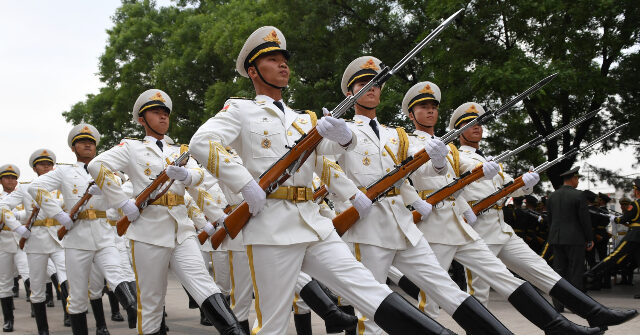Chinese Defense Minister Dong Jun delivered his first high-profile public address in months on Thursday, emphasizing the Communist Party’s resolve to destroy Taiwanese sovereignty.
Speaking at the Xiangshan Forum in Beijing – a platform for the Chinese government to expand its military influence which describes itself as promoting “equality, openness, inclusiveness, and mutual learning” – Dong repeated the false claim that “Taiwan is part of China.” In reality, Taiwan is a sovereign, democratic state operating its own government, military, education, health care, and other institutions wholly independent of the Communist Party. No government headquartered in Beijing has ever governed Taiwan.
“The historical and legal facts that Taiwan is part of China are beyond doubt, and the Chinese People’s Liberation Army (PLA) is always ready to defeat any external interference by force,” Dong declared, according to the Chinese state propaganda newspaper Global Times.
“The return of Taiwan to China is an integral part of the post-war international order,” Dong reportedly continued. “We will never allow any ‘Taiwan independence’ separatist schemes to succeed, and we are always ready to defeat any external interference by force.”
Beijing refers to the government of Taiwan as a “separatist scheme.”
Dong’s remarks on Taiwan are among the most aggressive from the highest ranks of the Chinese government in years, though Beijing’s state media arms and lower-ranking officials regularly threaten to invade the country. In recent memory, China’s rhetorical belligerence peaked against its neighbor in 2019, when genocidal dictator Xi Jinping delivered remarks in which he promised that anyone recognizing the sovereignty of Taiwan, or supporting the anti-communist protests in Hong Kong at the time, would have their “bones ground to powder.”
“Anyone who attempts to split any region from China will perish, with their bodies smashed and bones ground to powder,” Xi said at the time. “Any external forces that support the splitting of China can only be regarded as delusional by the Chinese people.”
Despite the return to violent rhetoric that Dong’s speech represented, the flagship Chinese state news agency Xinhua praised Dong for allegedly delivering a passionate vow to “safeguard world peace” as part of the Chinese security institution. The Ministry of Defense published the Xinhua summary, not the Global Times‘, on its English-language website.
“In a time full of challenges, cooperation is the best choice,” Xinhua quoted Dong as saying, adding that he claimed China is “willing to work with all parties to uphold security with concrete actions, enhance military mutual trust, step up multilateral coordination, and promote high-quality and efficient cooperation while improving related mechanisms.”
“The Chinese military stands ready to work with all parties to defend sovereign equality, uphold the post-war international order, bolster multilateralism, protect common interests, and jointly advance reforms to improve the global governance system,” he purportedly said.
Xinhua noted that Dong also repeated Xi’s increasingly common talking point that the world needs to “uphold a correct view on World War II” and “safeguard historical justice.” The Chinese government has invested significantly this year, the 80th anniversary of the defeat of Imperial Japan in World War II, in making the case that the Chinese communists – and not the Chinese Nationalists that would go on to found Taiwan – were instrumental in defeating Japan. Xi hosted a massive military parade to mark the occasion in early September, promoting the narrative that the Chinese communists were the most important factor in World War II.
The parade also served to present Xi as the alleged leader of a new world order in which the United States is absent as a major power, as Xi hosted Russian strongman Vladimir Putin, Indian Prime Minister Narendra Modi, and several other world leaders.
During Xi’s remarks at the parade, like Dong, the dictator used violent rhetoric to present an intimidating picture of the Chinese communists. The parade, he claimed, showed the Chinese people “are not afraid of violence, and are self-reliant and strong.”
“The Chinese people’s rejuvenation cannot be blocked, and the noble goal of the peaceful development of human civilization must triumph,” he asserted.
Dong’s speech at the Xiangshan Forum marks a return to top prominence for the position of defense minister in the country after several years marked by turbulence and corruption scandals. Reports in November 2024 indicated that Dong was under investigation for corruption, notably corresponding with his disappearance from major public events. The Chinese government never confirmed any such investigation, and Dong ultimately returned to the post, but he never received a position on China’s Central Military Commission (CMC), the top military body in the country.
Prior to Dong, predecessor Li Shangfu was unceremoniously removed from his position via disappearance in August 2023. Almost a year later, Chinese state media announced that Li had “seriously violated political and organizational discipline,” accusing him of taking bribes. The defense minister before Li, Wei Fenghe, suffered a similar fate and was denounced as a corrupt deviant in the same announcement that revealed Li’s alleged improprieties in June 2024, though he stepped down from the Defense Ministry post without apparent incident in March 2023.
China announced Dong Jun as its defense minister in December 2023 after leaving the post open for months following Li’s disappearance. He has largely kept a low profile on international affairs since then.
Taiwanese President Lai Ching-te has repeatedly emphasized the threat of growing belligerence from China during his term and led the proposal of a record large defense budget for the country in August. The Taiwanese government is preparing to increase defense spending by 22.9 percent in 2026, which would place Taiwan at the five-percent budget expenditure demanded of NATO member states. Taiwan is a not a member of NATO but the five-percent standard is often cited as critical to the defense of nations. President Donald Trump has also called for Taiwan, which receives significant help from the United States to protect it from China, to increase its own spending.
Follow Frances Martel on Facebook and Twitter.
Read the full article here



